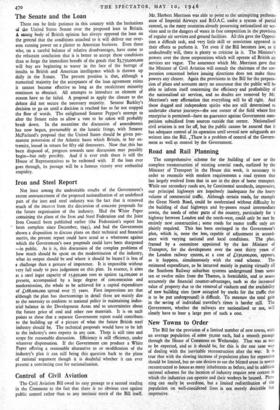Control of Civil Aviation
The Civil Aviation Bill owed its easy passage to a second reading in the Commons to the fact that there is no obvious case against public control rather than to any intrinsic merit of the Bill itself. Mr. Herbert Morrison was able to point to the uninspiring perform- ance of Imperial Airways and B.O.A.C. under a system of partial control, to the many countries already possessing nationalised air ser- vices and to the dangers of waste in free competition in the provision of regular air services and ground facilities. All this gave the Opposi- tion a difficult task, and very little skill or conviction appeared in their efforts to perform it. Yet even if the Bill becomes law, as it undoubtedly will, there is plenty to criticise in it. The Minister's powers over the three corporations which will operate all British air services are vague. The assurance which Mr. Morrison gave that the Minister of Civil Aviation will consult the chairman of the cor- poration concerned before issuing directions does not make those powers any clearer. Again the provisions in the Bill for the prepara- tion of plans and accounts carry no assurance that the public will be able to inform itself concerning the efficiency and profitability of the nationalised air services, and no doubts are removed by Mr. Morrison's easy affirmation that everything will be all right. And those dogged and independent spirits who are still determined to undertake charter journeys—the one corner of the field where free enterprise is permitted—have no guarantee against Government com- petition subsidised from sources outside that corner. Nationalised civil aviation is not far off, but the public cannot be assured that it has adequate control of its operation until several new safeguards are written into the Bill. ;There is a problem of control of the Govern- ment as well as control by the Government.


























 Previous page
Previous page